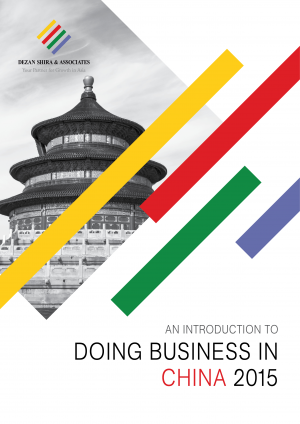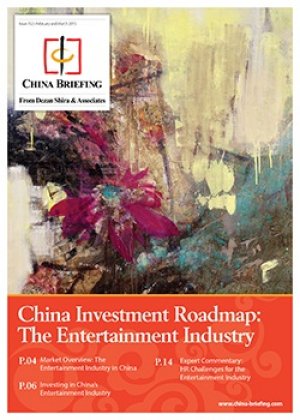China Regulatory Brief: Foreign Companies Allowed to Manufacture and Sell Video Game Consoles in China
Foreign Companies Allowed to Manufacture and Sell Video Game Consoles in China
China has officially lifted its 14-year-old ban on video game consoles. On July 21, the Ministry of Culture released an announcement stating that foreign companies are now allowed to engage in the manufacturing and selling of video game consoles in China. Based on the announcement, foreign companies must apply to the local cultural department for the approval to manufacture and sell video game consoles in China – a process stipulated to take 20 days. The Chinese government has lifted the ban as a pilot program in the Shanghai Free Trade Zone (FTZ) last year and has now expanded the policy nationwide. The lifting of the ban is expected to alter China’s lucrative video gaming market, which is currently dominated by PC and mobile games.
Restrictions on Minimum Registered Capital Removed for Internet-based Cultural Enterprises
China’s Ministry of Culture has recently announced its decision to remove the restrictions on the minimum registered capital of the internet-based cultural companies (RMB 1 million) and the minimum registered capital of companies engaged in online game industry (RMB 10 million). Cultural enterprises will still need to obtain the “Commercial Performance Permit,” “Entertainment Business Permit,” and the “Internet-based Cultural Business Permit” with relevant cultural departments. However, they are no longer required to submit the documents that have already been submitted when they apply for the business license before.
![]() RELATED: Trends in China’s Online Mobile Gaming Market
RELATED: Trends in China’s Online Mobile Gaming Market
Tianjin Allows Residential Area to be Used for Business Registration
On July 15, Tianjin released new measures relaxing business registration requirements, now allowing residential properties to be used for business premise registration. Applicants must acquire the lawful right to use the business premise before completing the business registration. Meanwhile, to simplify the business registration procedures, the Tianjin government removed the requirement of submitting certain certifying documents such as the approval letter from the house owners’ neighbors. The new measures took effect on July 20 and will be valid for five years.
Guangdong FTZ Allows Cross-border RMB Loans
Enterprises that are registered and established in the Nansha New Area and Hengqin New Area in the Guangdong FTZ, as well as enterprises that are registered in Guangdong province and are involved in key investment projects are now allowed to borrow RMB from Hong Kong and Macau. The funds can be either used within the FTZ or in foreign countries for business operations.
On July 13, Bank of China Guangdong, together with Bank of China Hong Kong and Bank of China Macao, issued an RMB 500 million medium-to-long term cross-border loan to Guangzhou Port, located in the Nansha New Area. The group also issued an RMB 60 million medium-to-long term cross-border loan to Zhuhai Shizimen Central Business District Building Holdings, located in the Hengqin New Area, the first of these cross-border RMB loans in the Guangdong FTZ.
|
Asia Briefing Ltd. is a subsidiary of Dezan Shira & Associates. Dezan Shira is a specialist foreign direct investment practice, providing corporate establishment, business advisory, tax advisory and compliance, accounting, payroll, due diligence and financial review services to multinationals investing in China, Hong Kong, India, Vietnam, Singapore and the rest of ASEAN. For further information, please email china@dezshira.com or visit www.dezshira.com. Stay up to date with the latest business and investment trends in Asia by subscribing to our complimentary update service featuring news, commentary and regulatory insight. |
![]()
 An Introduction to Doing Business in China 2015
An Introduction to Doing Business in China 2015
Doing Business in China 2015 is designed to introduce the fundamentals of investing in China. Compiled by the professionals at Dezan Shira & Associates, this comprehensive guide is ideal not only for businesses looking to enter the Chinese market, but also for companies that already have a presence here and want to keep up-to-date with the most recent and relevant policy changes.
China Investment Roadmap: The Entertainment Industry
In this special edition China Briefing Industry Report, we cast our gaze over the broad landscape of China’s entertainment industry, identifying where the greatest opportunities are to be found and why. Next, we detail some of the most important issues for foreign investors to be aware of, including legal, regulatory, and tax considerations specific to the industry. Lastly, we provide an insider analysis of the sector’s unique HR & payroll challenges.
 Revisiting the Shanghai Free Trade Zone: A Year of Reforms
Revisiting the Shanghai Free Trade Zone: A Year of Reforms
In this issue of China Briefing, we revisit the Shanghai FTZ and its preferential environment for foreign investment. In the first three articles, we highlight the many changes that have been introduced in the Zone’s first year of operations, including the 2014 Revised Negative List, as well as new measures relating to alternative dispute resolution, cash pooling, and logistics. Lastly, we include a case study of a foreign company successfully utilizing the Shanghai FTZ to access the Outbound Tourism Industry.
- Previous Article Visa & Tax Implications for Same Sex Marriage Partners in China
- Next Article China’s New NGO Legislation: A Blessing or Curse for Foreign NGOs?




























